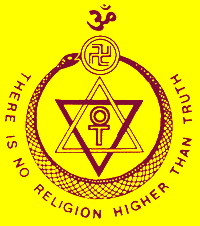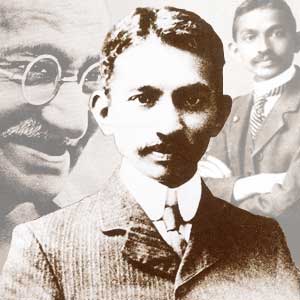Theosophical Society,


Mohandes K Gandhi Chronology
1869-82 - His youth was dominated by his family's strong belief in
a Hindu sect
called Vaisnavism whose chief tenets are
nonviolence and the belief that
everything in the universe is eternal. His schooling and grades
were mediocre.
He developed a burning passion for self- improvement and
philosophies of truth
and sacrifice. He married at age 13.
1887 - Joined
Sept, 1888 - Sailed to
1888-1891 - Studied in,
1889 - 1890 - Introduced
to H P Blavatsky and Annie Besant of the Theosophical Society in
H P Blavatsky meets Mohandes K
Gandhi
1891 - Returned home briefly and learned of his mother's death.
Gandhi found
that his law degree was not considered of too much value. He
accepted a mediocre year-long contract with an Indian firm in
1891-96 - In
being lndian. Gandhi would not accept the injustice as part of
the natural or
unnatural order in
man. He became
quite a proficient political campaigner.
1894 - Ready to return to
Legislative Assembly that would have
deprived Indians of the right to vote. In
response, he founded the Natal Indian Congress and worked to expose
the
discriminations practiced against the Indian population.
1896 - He went back to
the Indian
people and the prominent leaders to return to
The Europeans in
him upon his
return.
1899 - At the outbreak of the Boer War, Gandhi organized an
ambulance corps of 1,100 volunteers, arguing that Indians who claimed British
citizenship rights
were also obligated to fight with the crown.
1906 - After the British victory, the
for the
registration of the Indian population. Gandhi organized a mass protest
meeting and convinced the Indians attending to take a pledge to
both defy the
ordinance and to suffer all the penalties which came from their
defiance.
1913-14 - Gandiii negotiated an agreement
with General Jan Christian Smuts which ended the seven-year-long struggle
against the ordinance. Hundreds had gone to jail in protest, and thousands had
struck work, facing terrible repression.
Gandhi had frequent stays in jail, during one of which he made a
pair of sandals
for Smuts. When Gandhi left for
has left our shores;
I hope forever."
1915-19 - A time of relative inactivity. Gandhi helped recruit
soldiers for the
lndian Army, though
at the same time he criticized British officials for their
treatment of the Indian peasantry. In 1919 after the passage of
bills that
allowed for the imprisonment of Indians suspected of sedition
without trial,
Gandhi announced a satyagraha struggle.
This shook the continent.
1920-24 - Gandhi led thousands of satyagrahis
to defy discriminatory laws as he
argued that the main obstacle to home rule was not colonial force
but the
spiritual imperfections of the Indians themselves. The program of
non-violent
noncooperation included
strikes and boycotts of British manufactured goods. In
1922, Gandhi decided to call off the action after outbreaks of
violence. He was
arrested and sentenced to six years for sedition. Released after an
operation
for appendicitis, Gandhi found that suspicion had grown between
Hindu and Muslim factions. He conducted a three week fast to encourage people
to follow the path of non-violence.
1930-32 - After a period of relative inactivity, Gandhi began a satyagraha
campaign to protest the tax on salt. The action resulted in
imprisonment of over
60,000 persons. A truce was called in 1931 and Gandhi attended a
Round Table
Conference in
1934 - Gandhi resigned from the Congress Party after coming to the
conclusion
that his followers had adopted nonviolence only as a political
tactic. He began
to concentrate
on rebuilding
programs that
emphasized cottage industries and a style of communal living,
education he felt more suited to the peasant population.
1942-47 - In the last phase of British rule, Gandhi was once again
politically
active in demanding for the immediate withdrawal of British
colonialists. The
government responded by imprisoning the entire Indian Congress. With
the victory of the British Labour Party in 1945, new negotiations ensued which
ended in the plan of 1947 to create two new dominions of
January, 1948 - While on his way to an evening prayer meeting,
Gandhi was
assassinated by Nathuram
Godse, a young Hindu fanatic.
Theosophical Society,